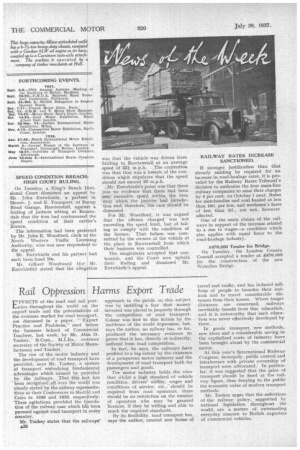Rail Oppression Harms Export Trade E FFECTS of the road and
Page 30

If you've noticed an error in this article please click here to report it so we can fix it.
rail position throughout the world on! the exporttrade and the potentialitibs of the overseas market for road tran ort, are discussed in a paper, " E port Practice and Problems," read lefore the Summer School of Comm rcial Teachers, last week, by Mr. Aln 0. Tookey,' I3.Com., M.I.Ex., ov rseas secretary of the Society of Motor Manufacturers and Traders.
The rise of the motor indust and the development of road transporti have provided, says Mr. Tookey, a s stem of transport embodying fundai4iental advantages which cannot be pr vided by the railways. That this fa 4t has been recognized all over the worli was clearly stated by the railway representatives at their Conferences in Madr,d and Cairo in 1930 and 1933, respectively. These agitations provided the f undation of the railway case which 14 been pursued aoifist road transport in every country.
Mr. Tookey states that the railways' A.28 approach to the public on this subject was by instilling a fear that money invested was placed in jeopardy through the competition of road transport. Colour was lent to this fiction by the incidence of the world depression, but, says the author, no railway has, so far, produced the necessary evidence to prove that it has, directly or indirectly, suffered from road competition.
In fact,. he says, the railways have profited to a big extent by the existence of a prosperous motor industry and the development of road transport both for passengers and goods.
The motor industry holds the view that whilst a high standard of vehicle condition, drivers' ability, wages and conditions of service, etc., should be required from road operators, there should be no restriction on the number of operators who may be granted licences, if they be willing and able to reach the required standards.
By its flexibility, road transport has, says the author, created new forms of travel and traffic, and has induced millions of people to broaden their outlook and to travel considerable distances from their homes. Where longer distances are concerned, railways inevitably benefit from this education, and it is noteworthy that such education was never effectively developed by them.
In goods transport, new methods, new ideas and a considerable saving in the capitalized costs of industry have been brought about by the commercial motor.
At this year's International Railway Congress, monopoly, public control and interference with private ownership of transport were advocated. In particular, it was suggested that the price of transport should be fixed at the railway figure, thus denying to the public the economic value of modern transport methods.
Mr. Tookey urges that the reflections of the railway policy, supported by national legislation throughout the world, are a matter of outstanding everyday concern to British exporters of commercial vehicles.




















































































